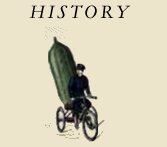




|

"It is true, the spoken word enlightens both the spirit and the soul. Indeed, the HENDRICK’S Master Distiller can often be heard talking at length to her ‘two little sweeties’ – the delightful and peculiarly small copper pot stills from which the most unusual gin flows."
|
GIANTS AND ANATOMISTS
with Dr Julie Anderson
Tuesday 27th March 2012
Doors at 6 pm, Talk commences at 7 pm
Any visitor to the Hunterian Museum at the Royal College of Surgeons in London is drawn to the skeleton of Charles Byrne. At the back of the rows of attractively lit glass cabinets, Byrne’s skeleton looms high over the viewer, his skull typical of the condition of acromegaly, a result of a greatly enlarged pituitary gland, caused by a tumour responsible for his gigantic stature. His presence there is still a subject of much controversy, as Byrne did not give permission for his skeleton to be preserved. This talk
explores the relationships between giants, anatomists and others who sought to make money from the body of a deceased giant in the late eighteenth and early nineteenth century. The paper will touch on the relationship between the giant and their own body, the nature of display and a continuation of public fascination which was played out through a sense of ownership that existed long after life had left the massive body. It will also focus on the relationship between scientists such as anatomists and those with unusual bodies for whom science held in particular fascination, in their quest to
understand the function of the human body and understand ‘normality’ through the study of what was deemed abnormal.
Height cannot be hidden after death. It dwells within the bones and a giant could not separate themselves from their physicality after death. While a giant may have had some agency over their body when they were alive, their remains were under threat. This talk will take you into a Georgian underworld, with giants living in fear for their immortal souls, and will detail the efforts that some giants took so they would not suffer the same fate as Charles Byrne.
Dr Julie Anderson
Dr Anderson completed her undergraduate studies in Australia and finished her PhD at Leiin 2001. In that year, she was appointed to a Research Fellowship at the University of Manchester where she worked until 2009 when she was appointed Senior Lecturer in the History of Modern Medicine at the University of Kent.
Her research interests cover the history of medicine in the late nineteenth and early twentieth century. She is particularly interested in the cultural and social history of physical disabilities and blindness, and is currently completing a monograph on a medical history of blindness 1900-1950. Dr Anderson also researches war and medicine and has just completed a monograph on rehabilitation in the Second World War. In addition, she has written on medical technologies, particularly those for people with disabilities. Dr Anderson has worked with a number of partners to promote awareness of the history of disability, including the Royal College of Physicians. She is Chair of the Disability History Group and also co-editor of a series on the history of disability with Manchester University Press.
Talk takes place at The Last Tuesday Society at 11 Mare Street, London, E8 4RP - please click here to buy tickets
|

